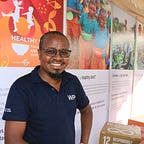Mary Ekuwam: The face of resilience in Nadapal community, Northern Kenya
A beacon of hope
“The word ‘etic’ in my language means work,” said Mary Ekuwam, the group’s chairlady since 2011. “We named the group ‘etic’ because we are women who work.”
And work hard they do.
This group of 30 women are the beacon of hope not just in Nadapal, a community close to Lodwar town in Turkana County, but beyond.
“People look at us and think we have accomplished our dreams, but I say we have only moved a few steps,” says Mary. “We have a lot more ahead of us.”
The group is farming an 80-acre irrigated piece of land, growing mostly sorghum and cowpeas. But they also have a four-acre garden where they grow vegetables for sale and for their consumption. The women are weaving baskets, keeping goats for milk, running small businesses and making ornaments using beads.
In particular, Mary is proud that as group, all the women know the importance of educating girls and are active against harmful traditional practices such as female genital mutilation. It is this spirit that draws other women to Mary Ekuwam.
“We appreciate the need to come together as a group to learn new ways of tackling societal issues and challenges such as hunger,” says Mary. “Our money that we save together has helped each one of us and our lives are changed. In this group, no one can go for a full day without a meal.”
Greater goals
Etic Women’s Group does not wish to stop at self-sufficiency.
The group, which stopped receiving transfers from the United Nations World Food Programme (WFP) through its asset creation activities in 2015, hopes to become a top supplier of food to the County Government among other institutions.
At the moment, the group is getting ready to supply 40 metric tons of cowpeas and sorghum to WFP through the Local and Regional Procurement programme. This United States Department of Agriculture-funded programme seeks to introduce locally grown foods into the school meals menu, a move that is expected to boost agricultural production directly benefiting local farmers.
So far, Etic has twice won the tender to supply schools through the government led Home-grown School Meals Programme as well as well as being a regular supplier of food to local secondary schools. Through Home-Grown School Meals, the group estimates to earn between half and one million Kenyan shillings a year (US$5,000–US$10,000)
Etic group also aims at obtaining additional equipment that will allow them produce and package sifted maize meal. The current milling and fortification (using a hammer mill) enterprise earns the group an average of US$2,000 to US$3,000 a year.
It is this success that has elevated Mary to a leadership role in the sub-location, an administrative unit that combines several villages.
Mentored to mentor
Mary is currently mentoring ten other groups in Nadapal, including two youth groups. But it did just happen by magic.
“When I was growing up, my family was rearing animals,” said Mary. “A severe drought in the 1980s wiped out the whole flock forcing us to leave the mountains and settle in Nadapal village.”
As a young girl, Mary started weaving mats and was eventually inspired by the Roman Catholic mission to start a women’s group.
Several training courses later, the Etic Women’s Group was registered in 2011.
Generosity at sharing information
“What sets Mary apart is her desire to share information,” said Josephine Eripon, the leader of Ngitorongkes farmers group, a fairly new arrival with 15 members. “She always relays information to us, whether feedback from a seminar or information from the agricultural extension office. She makes sure everybody gets the message.”
In particular, Mary has taught other women how to run table banking or village savings and loans because this was a key to the success of Etic.
The group received seed capital from the United States Agency for International Development to start table banking. The group has used the savings and loans scheme to help each other out through difficult times, put children through higher education and celebrate life’s milestones.
In Kenya, WFP’s asset creation activities are made possible through the generous support of: Australia, Canada, the European Commission, Finland, Germany, Italy, Japan, Kenya, Luxembourg, Multilateral Donors, Norway, Private Donors, Russian Federation, Sweden, Switzerland, UN CERF, and the United States of America.
